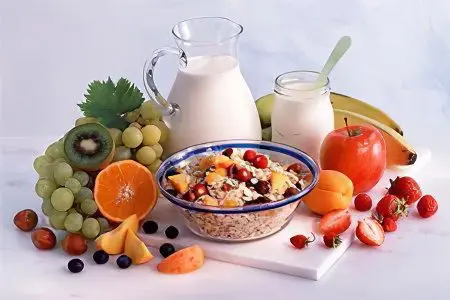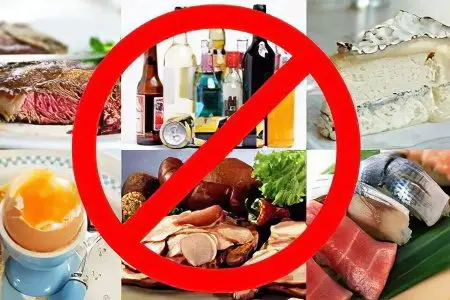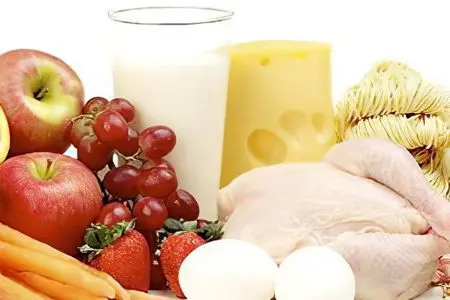Contents

Pyelonephritis is a kidney disease of an infectious-inflammatory nature. Compliance with the diet in this disease is an essential condition for the recovery of the patient. Dietary nutrition will need to be followed both in the stage of exacerbation of the disease, and during its remission.
The diet for chronic pyelonephritis in adults is based on the following principles:
Organization of the most gentle working conditions for the kidneys by reducing the load from them;
Bringing the patient’s metabolism back to normal;
normalization of blood pressure, which is often elevated in chronic pyelonephritis;
Reducing the severity of edema, if any;
Excretion from the body and, first of all, from the kidneys of pathogenic agents and toxic products of their vital activity.
Doctors most often with chronic pyelonephritis recommend sticking to table number seven according to Pevzner. It comes down to a slight decrease in the amount of protein. At the same time, carbohydrates and fats must fully comply with the physiological norm of a healthy person. Equally important is the inclusion in the diet of foods containing a sufficient amount of vitamins.
The maximum daily calorie content can reach 2700 – 2900 kcal.
The basics of the diet for chronic pyelonephritis in adults
Food processing methods. During an exacerbation of the disease, it is advisable to use only gentle methods of processing products: casseroles, boiling and steaming. During a stable remission, moderate frying of foods can be allowed. Food should not be crushed or twisted.
Eating mode. In order for the patient not to experience a deficiency in useful microelements and nutrients, food intake should be regular. The number of approaches is equal to five. Regular nutrition allows the kidneys to more easily remove metabolic products from the body and normalizes the patient’s condition as a whole.
Salt. Any inflammation in the kidneys, including chronic pyelonephritis, contributes to the fact that their filtering and excretory potential suffers. That is, toxic decay products remain in the body longer, exerting a negative impact on it. This is further facilitated by excessive salt intake, large doses of which cannot remove diseased kidneys. As a result, a person may experience swelling and increased blood pressure, as well as the formation of stones in the kidneys. At the discretion of the attending physician, he makes recommendations to his patient regarding the restriction of salt. As a rule, its daily dose should not exceed 6 g.
Alcoholic drinks. Any alcohol in this inflammatory disease is strictly prohibited. It increases the load on the affected organs, slows down the removal of decay products, increases swelling and exacerbates chronic pyelonephritis. Therefore, alcohol is contraindicated in any, even minimal dosages.
Thermal component. There are no restrictions in this regard. Food temperature does not differ from that for healthy people without a history of chronic pyelonephritis.
Alkalizing products. To shift the acidity of urine to a smaller side, you should eat foods that contribute to its alkalization. These are dairy products, milk, vegetables and fruits. In this regard, a dairy-vegetarian diet for adults with chronic pyelonephritis is preferred.
What products are prohibited?

Dietary nutrition in chronic pyelonephritis provides for a ban on any products that irritate the urinary tract, and also contribute to excessive excitation of the nervous system.
Protein products, in particular fish and meat, are subject to some restriction. This is due to their ability to shift the composition of urine towards increasing acidity.
Products containing essential oils, oxalic and lactic acids are subject to complete exclusion.
Easily digestible carbohydrates create a favorable environment for the reproduction of bacteria. Any legumes have a similar effect. Therefore, peas, beans, chickpeas, etc. are banned.
The full list of prohibited foods for chronic pyelonephritis is as follows:
Any rich broths, including those based on mushrooms. Therefore, after the meat or fish boils in water, the liquid must be drained, and the base for the soup placed in clean water.
Fatty fish, especially smoked and salted fish, should be banned, the same applies to seafood.
All fatty meats.
Any semi-finished products: sausages, sausages, caviar, canned food.
Smoked products and grill.
Onions, garlic, any legumes, spinach and sorrel, radishes and radishes.
Pickles and marinades, sauerkraut.
Mushrooms, regardless of how they are cooked.
Sauce based on horseradish, mustard, pepper.
Pork fat and any cooking fats, especially margarine.
Fatty or spicy cheeses and cheese products.
Strongly brewed coffee or strong tea, cocoa.
Confectionery and pastries should be limited, and completely excluded during the period of an exacerbation of the disease.
What products are allowed?

The patient should eat those foods that are conducive to reducing the acidity of urine and its alkalization. This contributes to the fact that the work of the kidneys is normalized and it is easier for them to cope with pathogenic microorganisms. In addition, in the alkaline environment of urine, bacteria die much faster.
It is strictly forbidden to reduce the volume of fluid in chronic pyelonephritis, especially if the doctor did not give such recommendations. It flushes the urinary tract, promotes the removal of infection from the kidneys in large quantities. In addition, the body is freed from toxic products of their vital activity and decay.
Therefore, the list of allowed foods and drinks includes:
Fruit drinks, and cranberry juice is especially popular. You can drink weakly brewed tea based on herbs, green and black tea, compotes, jelly, rosehip broth.
You can include in the diet pastries based on yeast dough, as well as unsalted bread, preferably yesterday.
You can eat lean meats: poultry, fish, beef. It is better to boil or bake it.
Useful milk soups, cereal soups, vegetable soups.
Vegetables such as pumpkin, zucchini, cucumbers, dill and parsley, beets, carrots have a diuretic effect.
When it comes to eggs, don’t eat more than one egg a day.
Any dairy products and milk are useful.
You can eat pasta, cereals, gourds.
Vegetable and butter, but not salted butter.
Sauces must be prepared on the basis of milk, sour cream or vegetable broths. It is possible to add vinegar or citric acid to them.
If a person is being treated in a hospital, then he can bring berries and fruits to provide the body with a supply of vitamins.
Compliance with the diet will extend the time of remission, speed up the recovery of the patient. If you refuse to comply with it, then the likelihood of developing serious complications increases significantly. In addition, in patients who do not adhere to dietary nutrition, the symptoms of chronic pyelonephritis increase.
Once a week, patients can arrange fasting days. They can be based on fruits, vegetables, dairy products or cereals.









